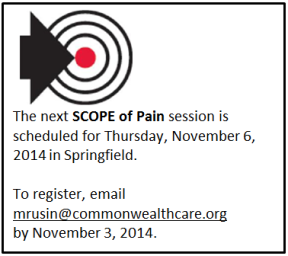Training takes on opiate addiction, overprescribing, and chronic pain management
September 18, 2014 § 2 Comments
Too many members of our communities suffer from opiate addiction and overdose on pain medicines prescribed by physicians. In fact, Massachusetts Governor Deval Patrick declared a public health emergency to fight the rise in opiate abuse earlier this year. Stating that overdoses from opiates such as heroin rose 90% in the state between 2000 and 2012, Patrick called for “more rigor over the overprescription of pain medication.”
To help address this problem, we are sponsoring SCOPE of Pain, a seminar for physicians, nurses, and other health care professionals. The program confronts the problem of opiate addiction and provides guidance on effectively managing patients with chronic pain.
 What is SCOPE of Pain training?
What is SCOPE of Pain training?
The Massachusetts Board of Medicine requires yearly training in safe opiate prescribing and risk management. Through SCOPE (Safe and Competent Opioid Prescribing Education) training, we hope to help physicians prescribe more safely and help our patients manage their pain more effectively, while also seeking to reduce access to prescription opiates on our streets.
Topics addressed in SCOPE of Pain training include the most current evidence-based scientific guidelines for evaluating pain and prescribing opiates in the safest manner possible. Attendees will learn best practices for screening and counseling patients who have chronic pain, ways to detect signs and symptoms of addiction in normal medical practice, and more effective ways to obtain appropriate care for individuals, which will help in recovering and rebuilding their lives.
Moreover, health care professionals who complete the training will be better able to identify patients who need counseling and drug rehabilitation. This will help patients to receive appropriate mental health care and achieve recovery sooner than ever.
Addiction and overdose problems in dual-eligible populations
According to Ruth Potee, MD, who conducts the SCOPE of Pain sessions, “the last 20 years of pain management in the United States has relied on several false notions: more opiate pain medicine is good and addiction rates will remain low.” These false notions have contributed greatly to our current opiate emergency and created great challenges for dual-eligible populations. Potee believes that “20% – 30% of patients using chronic opiates are addicted, and these rates are higher in the dual-eligible patients cared for by the Commonwealth Care Alliance.
“Why? Potee explains that many seniors with complex medical conditions, disabled persons, and those with mental health issues suffer from chronic pain. As such, some in these populations take opiates in unconventionally high doses or engage in excessive use of short-acting and more addictive medications. In addition, problems such as tolerance to opiate therapy, resistance to considering safe and effective alternatives to opiates, cross-prescribing, and more are often present in dual-eligible groups.

